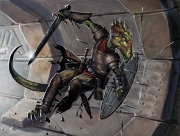|
A1
|
|
|
|

|
| # ? Apr 27, 2024 15:07 |
|
A1 but we should try and double-reform the Faith and become Slavic Pseudo-protestants, shunning the Perun-centric Polish hierarchy.
|
|
|
|
B1 though it looks like A has it to be fair.
|
|
|
|
A2 We must build a kingdom to surpass Poland.
|
|
|
|
E2 Let's fight it out
|
|
|
|
Okay I'm gonna be honest: I didn't think this many people actually were reading this drat thing, so I set the end date for the vote for Saturday, assuming there'd be just a few votes and some people reading to catch up. Well I was super wrong, as it turns out, and, well, there's actually a pretty run away choice for this one. So, I'm gonna go ahead and move up the end date for the vote to Friday, since I don't anticipate too much of a change and I'd really like to get back to playing the game, but I still want to make sure people catching up can vote. So yeah, voting ends tomorrow folks!
|
|
|
|
A1 Naturally we'll have to steal the leadership of the faith from the Poles at some point, though.
|
|
|
|
A1 I don't play republics as much so it would be cool to see. How does the reformed Slavic High Priest work? Is it like a normal temple inheritance, or more like the papal council?
|
|
|
|
Orcs and Ostriches posted:How does the reformed Slavic High Priest work? Is it like a normal temple inheritance, or more like the papal council? I believe its a normal temple inheritance, but they're the vassal of whoever reformed the religion, giving them the ability to control Great Holy Wars. Its a fairly powerful ability to have and I'm sure that Poland will never use it to shamelessly gain land at the expense of all the other Slavic nations.
|
|
|
|
E1 I'm sensing a comeback. 
|
|
|
|
B1!
|
|
|
|
E1
|
|
|
|
A 2
|
|
|
|
Okay, voting is now officially closed. The winning vote combination was A1. Update will happen shortly, in an hour or so.
|
|
|
|
Chapter 17: Sword of Perun The members of the veche almost unanimously demand that Ruslan accept Prendota's new faith, even if it is more focused on Perun than they would like. As soon he has the veche's decision, Ruslan writes to King Prendota and High Priest Karol, asking for priests and scripture for himself and his chiefs, so that they may better spread the reformed faith to the people; the Poles are only too happy to oblige and soon Polish priests are swarming Novgorod, advising the veche and Ruslan of how to properly venerate the gods.   Of course, there is still an ongoing war and while Ruslan is in Novgorod, his commanders continue in his name; soon Riga falls to the Ilmenian army and Fedot comes begging for his life. The terms are sent back to Novgorod and Ruslan finds them to his liking and peace between the two kinsmen is made in July of 859.    Ruslan also makes the begins sending the Polish priests to the handful of his chiefs that haven't yet embraced the reformed faith. His first target for conversion is the Orthodox Sviatoslav, hoping that he can be convinced to abandon the Greek god and embrace the proper faith of all Ilmenians. Initially things look good, as the Greek priests that helped Prendota codify the Slavic rites included many of their own religion's practices, maybe in an effort to secretly get the pagans to convert to Orthodoxy, but after a particularly heated debate, Sviatoslav rejects the Slavic faith, claiming that it is but a pale imitation of Orthodoxy. This is not exactly what Ruslan was hoping for and he worries what this means for the new religion.   Still, there is work to be done and a realm to restore, so Ruslan hides his worries and in July he approaches the veche to ask for their support to retake Kurzeme from a chief that declared himself independent when Rogvolod took the throne. The veche is in favor and Ruslan prepares to leave, when one of the Polish priests quietly points out that Yaroslav of Kerzeme has not accepted the truth of the new Slavic faith and that it may be the perfect opportunity to teach others how foolish such a decision is. The wording of the war declaration is slightly modified and instead of a war of reconquest, it becomes one of religious fervor; it is the first Slavic holy war.  The two armies clash at Riga and it is immediately clear that Perun favors the Ilmenians; later, Ruslan and his men would swear that the spirit of Perun drove them to insane feats of bravery and strength during the battle. Filled with this zeal, the Ilmenians continue to Kurzeme, where they once again beat Yaroslav's armies. Soon after, Kurzeme falls.    Peace is made and Kurzeme is once again made part of Ilmen. While this alone is cause for celebration, the fact that the war was a done in the name of the Slavic faith also gives Ruslan and the veche a new tool to use to manage the chiefdom: religion.  Ruslan and the veche immediately use this tool to cement their control over the chiefdom; early on in Ruslan's rule, he and the veche had passed a new law in an effort to gain some sort of leverage over the many non-Slavic chiefs, though they never had any intention of using it to actually strip their titles. Now though, with the strength of the new Slavic faith, that threat is no longer just a threat, its a reality. At the start of the new year, Ruslan and the veche send word to the Catholic chief of Torzhok that he is to convert to the Slavic faith or to surrender his cheifdom to Ruslan. Rostislav refuses to convert and, realizing that he has no real support outside of Torzhok, he surrenders control of his chiefdom to Ruslan without a fight.   Of course, its not just the Christians who are at risk of losing their realms if they do not bow to the wishes of the high chief and the veche. Yelisey of Narva has refused to accept the reformed Slavic faith and has instead stuck with the old ways, claiming that Ruslan has betrayed Jarilo and his people by accepting the Polish rites. But, for all his bravado, when the time comes to make a stand for his beliefs, he instead chooses to surrender his titles to Ruslan.   And so it goes, as the veche and Ruslan demand that the chiefs of Ilmen conform or lose their titles. While many do agree to adopt the Slavic faith, many also do not and soon Ruslan finds himself in control of lands in Estonia and Lithuania.   With his realm now firmly under his control and all possible dissenters removed from power, Ruslan turns his attention to the chiefdom of Severia, who are one of the few East Slavic tribes to still cling to the old Slavic faith. The Severians are distant cousins of the Ilmenians, but where the Ilmenians have mostly interacted with non-Slavic tribes, like the Estonians and Finns, the Severians have assimilated the Volhynians and gotten into numerous conflicts with the Poles over Kiev and, as a result, are extremely distrustful of the Polish led reformed faith. Ruslan cares for none of this and only sees a chance to use his religion to snatch some land from a potential rival.  Unlike the chief of Kurzeme, the Severians are more than ready for war and when they engage the numerically superior Ilmenians at Smolensk, they manage to kill three thousand Ilmenians at the cost of five hundred Severians. Its an absolutely humiliating defeat for Ruslan and a blow to the reformed Slavic faith.  While Perun ignores the plight of the Ilmenians, Jarilo stands by his people, blessing Novgorod's traders with a particularly good haul, showering the city with foreign coin. This blessing comes at a particularly dire time, as the Severians rampage through the chiefdom's countryside and more soldiers are needed to defend the realm.  The war drags on for a year, as Ruslan regathers his forces. Finally, in summer of 861 Ruslan and his army lay siege to the Serevian city of Tver, taking it in August of that year. Surprisingly, there's no response from the Severians and it isn't until later that Ruslan finds out that the Prussians, of all people, have launched their own invasion of Severia.  As summer turns to fall, more men flock to Ruslan's banner; mostly from the Ilmenian countryside ravaged by the Severians, these men are deadly serious about defeating the Severians and paying them back for the destruction of their towns and farms. These men join up with Ruslan's main army and in winter help take the city of Bryansk; for their help and to help rebuild their lost homes, Ruslan grants them the privilege of looting the city first. Bryansk burns for days.   In 862, followers of the old rites rise up in Narva, seeking to create an independent chiefdom for themselves. Ruslan prepares to march north to defeat them, but to his surprise, loyalists rise up against the heretics and defeat them before Ruslan can even arrive; as it turns out, not everyone is displeased about the reformed rites.   Word reaches Ruslan that the Severians have laid siege to Tver, so he redirects his army towards the city. This time the Ilmenians are able to defeat the Severians, who have been ground down by their war with the Prussians.  Towards the end of 862, news arrives from Poland; apparently King Prendota has been recruiting zealous warriors for a new sort of army, one dedicated not to any single king or chief, but to the Slavic faith. He calls them the Warriors of Perun and gift them some land in Poland as their base of operations. True to his word, they remain independent of his realm, unlike the Slavic Church. They are led by a Pole named Feodor, who commands nearly nine thousand zealous warriors.   One the back of this news, Ruslan wins another victory over the Severians at Chernigov and it seems that 862 is the year where the reformed Slavic faith finally asserts itself over the old rites.  Of course, not everyone wants the Slavic church to succeed, as more old Slavic heretics rise up in Uglich. This time no such loyalists rise up to stop them, so Ruslan breaks his siege of Chernigov and marches to destroy these heretics. Along his way to Uglich, he encounters an army of Mordvins hired by the Severians to liberate Tver for them and Ruslan takes the time to defeat them; it becomes clear the the old rite heretics are more willing to work with the Suomenusko heathens than accept the light of Perun.   Some good news reaches Ruslan in January of 863 as he rides with his army to Uglich: the Orthodox Ilmenians of Kalevan have accepted the truth of the Slavic church, though the city's Greek minority still follow the Orthodox church in secret.  Ruslan and his army arrives in Uglich in February and engages the heretic army, capturing their leader in the process. With their leader in Ilmenian hands, the revolt falls apart and finally fizzles out not too long after.   The war against the Severians has dragged on for nearly four years, with the Severians dodging any attempts by the Ilmenian army to pin them down and engage them in battle, as well as several old rite revolts forcing the Ilmenian army to break their sieges and leave the front to go fight the rebels. The Ilmenian warriors, once filled with zeal and religious fervor, have become tired and have slowly started to desert; Ruslan is unsure of how much longer his army will last, while the Severians seem as fresh as ever. Desperate to gain some resolution to the war, Ruslan calls upon the Warriors of Perun, promising them a small plot of land in Estonia for their aid; they respond to his call and soon arrive in Novgorod.  In May of 863, the Serevians liberate Bryansk from Ilmenian control and it looks like the Severian War will continue for another four years.  The Warriors of Perun join Ruslan's army and Feodor immediately beings asserting himself, advising Ruslan and his commanders the best course of action to swiftly end the war. At first Ruslan is completely stunned by the Pole's attitude, but that shock turns into admiration, and then jealousy at his strategic ability. For a long while, Ruslan grapples with these feelings, before finally coming to the conclusion that the gods made everyone different and that it is their will that men work together, to compliment the abilities of others. When the Ilmenians and the Warriors of Perun arrive in Bryansk, Ruslan is a changed man and more than willing to take a back seat to his generals and Feodor. 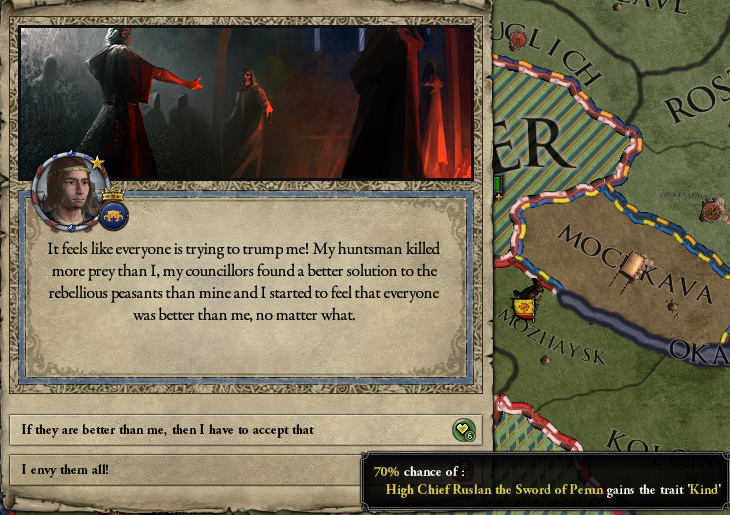 The Warriors of Perun lead the charge at the siege of Bryansk, storming the walls and taking the city. But Feodor doesn't stop their and orders the Warriors and the Ilmenians next to lay siege to the temple of Pochep, which is more of a traditional siege, instead of the frenzied storming of the walls that Bryansk was. Finally, with their cities and temples plundered and burned, the Severians surrender. Tver is made part of Ilmen and Ruslan returns to Novgorod, a hero; the people begin to call him "Mech Peruna," or the Sword of Perun.    The reformed faith is on the rise in Ilmen and with it comes other reforms and changes, further strengthening the chiefdom and its people, all at the cost of some of their traditions and beliefs. One time will tell if this is a net positive, or a horrible misstep by Ruslan and the veche.
|
|
|
|
Hell yes Mech warrior
|
|
|
|
Chapter 18: Turmoil The Severian War has drained the coffers of the chiefdom, leaving it broke; thankfully the veche remembers the time of Briachislav Bezumnyy and is fully able to continue running the realm. Still, the debt comes at a bad time, as Suomenusko heathens begin raiding Ilmen, taking advantage of the chiefdom's weakened state. The Warriors of Perun do what they can to defend Ilmen, but the chiefdom is too vast and the Suomensko raiders too numerous.  More bad news reaches Ruslan and the veche at the start of 864: Norse raiders have increased their raids on Alban and, as a result, more and more Ilmenian merchant ships have been taken or destroyed. Ilmen absolutely needs another trade partner outside of the civil war prone Byzantines, so a small loan is taken from the merchants of Novgorod to buy new ships and supplies. The chiefdom is spiraling into debt.  Ruslan also takes the time to listen to the problems of the peasants and in May a delegation of priests and farmers from Kurzeme arrives in Novgorod with a bound woman, demanding that Ruslan pass judgement on her for the crime of witchcraft. After interrogating the woman, Ruslan realizes that the young woman was simply teaching the Slavic faith to some Romuva peasants, but replacing the Slavic gods' names with those of the Romuva deities. While its borderline heretical, Ruslan sees the value of incorporating local traditions and deities into the new rites, so he dismisses the priests and peasants and invites the woman to stay in Novgorod at his expense to discuss her techniques.  Trade with the Byzantines continues to pay dividends, if only because of the constant flow of technology and new thought that reaches Novgorod, though this time its something more spiritual that the traders bring with them: they've brought back boxes and boxes of Greek bibles and scriptures, at the request of the priests of Novgorod, who are looking for useful traditions and rites to incorporate into the Slavic faith, in an effort to entice the Greeks and other Orthodox practitioners to convert. The Polish priests that remain in the city loudly denounce the Ilmenian priests, but Ruslan and the veche ignore their squawking.  A few the more hawkish and zealous members of the veche approach Ruslan and ask for his support in securing funds to build a statue of him in Novgorod, to commemorate his victory over the Severians. Ruslan flatly refuses them his backing, pointing out that to do so the realm would have to raise taxes and take out another loan; without his support, the proposal dies.  The Estonians of Ingryia accept new rites and completely abandon their old Suomenusko faith and, for the first time since the city and surrounding country were made a part of Ilmen, the Estonians are peaceful. Apparently sharing a common religion can go a long way to making them feel part of the chiefdom.  At the start of 865, the veche issues a proclamation, declaring that all wars against vassal chiefs must be put to an end for a period of two years. The drafter of this proclamation, Chief Illiya of Uglich, has been beset by numerous other chiefs and, using several favors owed to him by powerful members of the veche, has been able to save his chiefdom from annexation by his more powerful neighbors. Though the proclamation has no legal precedent behind it, Ruslan promises to back it with all the men at his disposal, making its questionable legality a moot point.  The few Ilmenian merchants that bother to trade with the Muslims of the Middle East bring news that there's been some sort of upheaval within their religion and that there are now two Muslims caliphs, each claiming to be the real head of the religion. Ruslan and the veche make a note of the affected areas and advise merchants travelling there to be careful.  One of Ruslan's vassals approaches him to discuss finding some land for non-inheriting sons and Ruslan decides to sell him the city of Kalevan for a hefty price. This immediately solves Ilmen's debt and gives the chiefdom a bit of a surplus of gold.  With the chiefdom back in the black, Ruslan approaches the veche for a declaration of holy war against the chief of Memel; Memel he argues is excellent placed for Ilmenian merchants and would greatly reduce the cost of the Alban trade route. Most of the veche sides with Ruslan, but a significant minority is worried that the Romuva chiefdom of Prussia will intervene on the side of the Memel; the Prussians, despite a significantly smaller force, was able to defeat the Severians and their chief has sworn to destroy the Slavic church. Despite these misgivings, war is declared in May of 865.  The chief of Memel storms Zemlia and takes the city, but Ruslan isn't particularly worried and he reasons that if he wants to waste his men forcing his way into the city, it'll make his job of taking Memel easier.  While Ruslan prepares for war, the veche spends a small amount to once again improve the city's practice range; archers proved to be useful during the Severian War and it would be stupid not encourage more men to take up the practice of using a bow.  The Ilmenians clash with Prussian army at Zemlia in Novmember and it quickly becomes apparent that the Prussians are absolutely insane in the heat of battle; after a few too many near misses, Ruslan calls for a retreat, despite the fact the Ilmenians still outnumber the Prussians. Ruslan is badly shaken by the experience and returns to Novgorod to recover, leaving his commanders to fight the war.   Still badly shaken, Ruslan snaps at his wife when she dares to suggest that perhaps Dennitsa shouldn't be allowed to just walk all over the dining table. He later apologizes to her, but the damage is done and its weeks before she even starts talking to him again.  With the war for Memel effectively stalemated, Ruslan and the veche take whatever good news they can; when the Estonians of Narva also see the light of the Slavic church and join their Ingryian brothers, they can at least sigh in relief that maybe days of the Estonians constantly rebelling are finally over.  In August of 866, the Ilmenian commanders once again try to break the Prussians holding Zemlia, but they are once again repulsed; they try once again in March of 867 but have no such luck. Its quickly becoming apparent that this war was foolish and that the gods do not favor Ruslan.   The Prussians don't remain at Zemlia after defeating the Ilmenians again in 867; instead they march to Riga and seize the temple, looting it before burning it to the ground. Zemgale falls shortly after and Ruslan and the veche both know that the war is lost. Peace is made in May of 867 at a hefty cost to the Ilmenians: the chiefdom is once again in serious debt.    Ruslan has just the way to relieve some of the debt, though: the chief of Rostov has embraced the old rites, giving Ruslan and the veche the right to seize his lands and gold. Chief Rodislav strongly disagrees with this choice and declares himself independent of Ilmen.   When news of Rodislav's rebellion spreads and soon a thousand zealous men arrive in Novgorod, looking for a chance to enforce the chiefdom's new religion. Ruslan is more than happy to take them up on their offer of support.  During the early days of the rebellion, the proposal to build a statue to commemorate the Severian War is once again brought up by the same members as the veche as before. Ruslan turns them down again, after a rather loud shouting match between him and their leader; he makes it clear that there's a war on and that it should be their only focus.  The rebels take the Belo Ozero in December, but the loyalist army doesn't even give them time to break camp and move before they engage them in battle. The main rebel army is broken nearly a week after seizing Belo Ozero and at the start of the new year, Belo Ozero is in loyalist hands once again.    With his army badly bloodied, Rodislav retreats to his lands, but Ruslan and the loyalist army is on his tail and manages to pin them down at Pereyaslavl Zalessky. During the battle, a young noble distinguishes himself when he saves Ruslan's life with a timely sword strike; he is immediately made part of Ruslan's personal entourage.   Pereyaslavl Zalessky and Rostov fall shortly after the Battle of Pereyaslavl Zalessky and Rodislav sees the writing on the wall; as Rostov falls, he sends word that he would be interested in a white peace between himself and Ruslan. Ruslan turns him away.  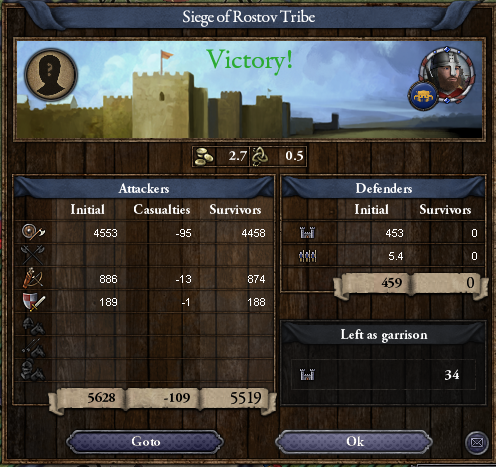  The rebels try to take back Pereyaslavl Zalessky in June of 868, but the loyalists easily defeat them; during the battle, Ruslan is towards the back, issuing orders and leading from the back, when a few rebels manage to slip past and attack Ruslan. Next thing Ruslan knows, he's covered in blood, the ceremonial axe of his office covered with blood and his attackers either dead or wounded and it is as if some otherworldly force protected him from harm. That night, Ruslan dedicates himself to Perun to show his thanks.   In Novgorod, the plans for the statue to commemorate the Severian War start making the rounds in the veche again, but with the rebellion and debt still an ongoing concern, it doesn't even get past preliminary discussions before being tabled again.  Toropets falls in August of 868, leaving just Zemgale as the final rebel hold out; the writing is on the wall and Rodislav knows. Peace is made not long after the fall of Toropets and Rodislav and his co-conspirators are arrested and thrown into jail.   The rebels are stripped of all their titles before being banished from the realm; finally, the long civil war is over and the chiefdom's wounds can finally heal. 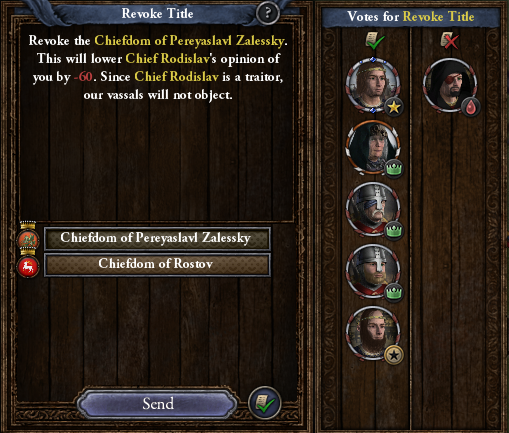    With the war over and the rebels punished, Ruslan returns to Novgorod, only to be greeted with terrible news: Dennitsa has died. Ruslan buries her in the garden created by Rodislav II Dobro and dedicates a small statue to Dennitsa.  In December, more bad news reaches Ruslan: one of his distant cousins, from a bastard branch of the family, has decided to bring the old rites back to the chiefdom at the point of a spear. Ruslan isn't sure the chiefdom can take another long, drawn out war, but he makes sure to prepare for the worst.  The Greeks continue to be a source of innovation as traders from Constantinople bring back books on tactics and strategy. Ruslan, with the backing of the veche, implements the teaching of them immeidately; the decision quickly pays off, as one of the chiefdom's commanders begins training his troops in the use of them and, in the process, improves his own skills at war.   Then, in 870, the Estonians of Saaremma rise in revolt; during the island's occupation by the Norse, the majority of its people had adopted Norse customs and traditions, including the Norse religion. Almost at the same time, the pretender Mstislav declares his war for control of the chiefdom.   The chiefdom is in turmoil and running on fumes; it is the hope of the veche that Ruslan can defeat the pretender and finally secure Ilmen for himself and the Slavic church, earning the realm much needed and deserved peace to recover from the last several years. Hopefully, that's just what Ruslan and Ilmen will get.
|
|
|
|
Obviously the thing to do is to embrace Veles as the patron deity of Novgorod and Ilmen. Perun is just going to keep dragging us into more wars.
|
|
|
|
Chapter 19: Khram Yarilo Ruslan decides to deal with the Estonians first, engaging them as they cross from Saaremma into Kurzeme; during the battle a man named Iziaslav proves himself to be an incredibly adept leader and fighter have the kills nearly twenty Estonians. Ruslan takes the man under his wing, with the intent of promoting him to commander when he returns to Novgorod. The Estonians are defeated and their leader sent back to Novgorod in chains, ending the revolt.   While Ruslan was busy with the Estonians, Mstislav and his army took the city of Vilnius with little resistance from the local garrison. This isn't particularly surprising and Ruslan maneuvers his army to catch them as they leave the city. Mstislav's army manages to slip by without the Ilmenians engaging them, but Vilnius is liberated. Still, even without a battle to be fought, Ruslan does manage to pick up some practical skills.    The proposal to create a statue is an eternal piece of legislation; it will always be with the veche, always circulating, but never being passed. At least, that's how its starting to seem.  The pretender and his army are finally pinned down at Toropets and Ruslan continues his policy of leading from the back, taking advantage of a hill to observe the whole battle. His slow, methodical plans win the day for the Ilmenians.   A tribe of Mordvins, paid by Mstislav, raid Pereyaslavl Zalessky. The Ilmenians pursue them back to their homeland and massacre them, taking back any loot they stole from Pereyaslavl Zalessky.   December brings a new request from King Prendota: his first wife has recently passed away and he's looking for a new one; his first pick is one of Ruslan's relatives. Of course, Prendota's choice isn't motivated by love and he's hoping that a marriage into Ruslan's family will lead to a full blown alliance between the two biggest Slavic powers; like Ilmen, Poland has been wracked by instability during the conversion to the new rites, but unlike Ilmen, the kingdom hasn't weathered the change very well. The result has been Prendota arresting anyone who dares challenge him, leading to his new nickname "the Evil." Still, the chance of an alliance with Poland is too good to pass up, especially in these dark times, so the veche approve of the marriage, though they don't move to make the alliance anything more than a non-aggression pact.  The people of Narva bring a woman to Novgorod, claiming she is a witch but, with a little investigation by the veche, they realize that like the case from a few years ago, the woman was simply using local traditions to help preach the Slavic faith. The veche, as Ruslan's acting agents while he's out fighting a war, condemn the peasants and invite the woman to stay in Novgorod, so that they may question her further about her methods and how successful they've been.  Ruslan's ambition grows, as word of the marriage between his relative and Prendota finally reaches him; he realizes that Ilmen is no longer a small chiefdom supported by trade with the distant Greeks, but rather a regional power that has the ability to influence the tribes around it. Ruslan dreams of bringing the chiefdom kicking and screaming into the future. He dreams of uniting all the Slavic tribes of the east.   Increasingly, Novgorod has become a major center of religion for the Slavic church, as priests come from around the realm to study the new rites, as well as offer guidance to the veche and the people of the city. Eager to break some of the Polish control over the church, the veche are more than happy to build a great center of religious learning and thought in Novgorod; the Khram Yarilo, or Temple of Jarilo, created the base for which a distinctly Ilmenian branch of the Slavic church would grow.  Using the Mordvins as a distraction, Mstislav and his army manage to retake Vilnius, before heading towards Zemlia. Ruslan rushes to meet them, not intent on letting them take another Ilmenian city for themselves. Mstislav is captured at the Battle of Zemlia and his war ends soon after, with victory for Ruslan.    With peace finally achieved, Ruslan returns to Novgorod with Mstislav in tow. He then takes his captive to the newly built Khram Yarilo where he prays to the gods for the continued prosperity of Ilmen, before asking the priests there to sacrifice Mstislav in honor of the gods; they are only too happy to oblige their chief. 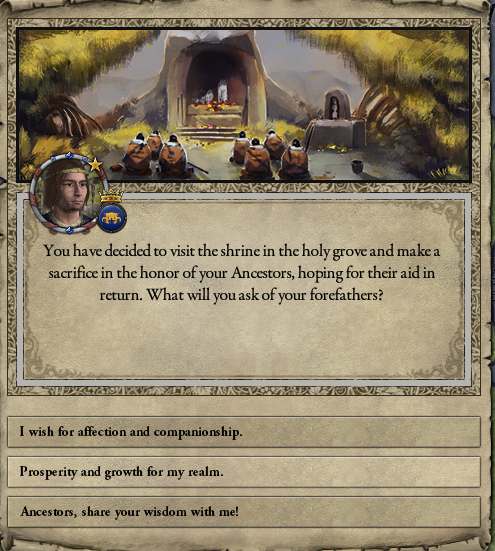   Ruslan also asks the veche to give him permission to give Rostov to his son Vysheslav, which they grant in light of his service to the realm and the veche; their only condition is that Ruslan attend a small feast in his honor and give a speech about the importance of duty to the crown. Ruslan does, much to the delight of the veche, who use the opportunity as a chance to get some much needed gold out of the assembled vassals.    Ruslan receives his wish for peace and prosperity, as for three years Ilmen doesn't suffer a revolt, civil war, or invasion; there's not even a raid by the surrounding tribes. Finally, in February of 874 the chiefdom is out of debt, with a small surplus of gold. The veche uses a small amount of this gold to once again expand Novgorod's archery range.  While the peace and quiet was much needed for the chiefdom to recover, Ruslan has only known war for the last several years and the prospect of uninterrupted fills him with a strange sense of dread and unease, putting him into a deep depression. That's why, in March, Ruslan approaches the veche to ask for their support to try and retake Memel, though this time he makes it clear that it won't be a full holy war.   The chief of Memel, a Lithuanian named Karnak, immediately attacks Riga, defeating the small garrison there, before they lay siege to Zemgale, which falls in August; Riga follows in September.    Ruslan marches to Zemgale intent on fighting Karnak's army, but upon seeing the size of their force, Karnak retreats to Memel. Ruslan retakes Riga and Zemgale, before marching towards Memel; Karnak again retreats, falling back into Prussian territory, leaving Memel for the Ilmenians to take. It appears without Prussian support, Karnak is not much more than a paper tiger.    With Memel under his control, Ruslan makes peace with Karnak and Memel is made part of Ilmen, but with one difference from the usual annexation: Karnak is made part of the city's new veche and the Romuva practitioners are allowed to practice their religion until Ruslan dies; Karnak and several Romuva lords are also given preferential trade rights, on top of everything else granted to them. The hope is that the preferential treatment, combined with Ilmenian traders and settlers, will convince them to peacefully convert to the Slavic church. One of Ruslan's relatives is then made the chief of Memel, though he is little more than a figurehead, as Karnak and the new Romuva merchants control most of the city.   In July of 875, Prendota offers one of his sister's hands in marriage to Ruslan, looking to further cement the relationship between the two chiefdoms. Ruslan is only too happy to marry into Prendota's family, mostly because Samboja, Prendota's sister, comes with an extremely nice dowry, which helps to relieve some of the debt incurred during the Second Memel War.   The raiders of Mochkava have long been a thorn in Ilmen's side and in December the veche gives Ruslan the authorization to hire a small band of adventurers to "deal with" the Mordvin chiefdom. As it turns out, the adventurers raze Mochkava to the ground, before slaughtering every man, woman, and child in the city, before settling into the remains of the city, giving it a more proper Ilmenian name: Moskva. The men of Moskva then pledge their loyalty to Ruslan, bringing the city under Ilmenian control.   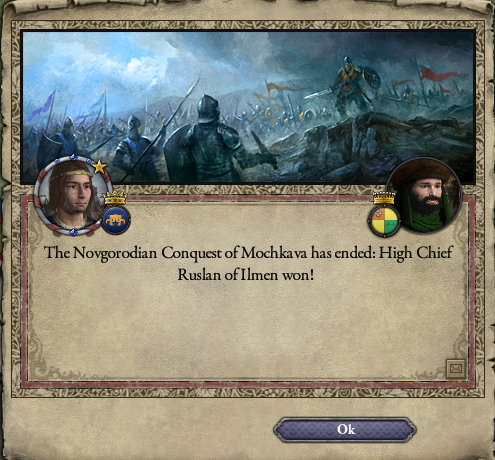 Prendota, the creator of the reformed Slavic faith, dies in July of 876 and is replaced by one of his relatives, a man by the name of the Stoigniew. Stoginiew's first act is to solidify the power of the king along the lines of the French and Greek empires; Poland has embraced feudalism.  In October the veche approves the overhaul of the capital's shipping docks, expanding them to accommodate bigger and more ships. 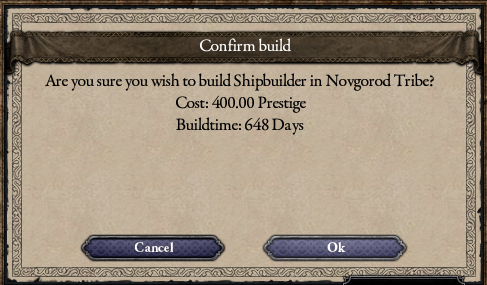 Finally, in June of 877, the proposal to build a memorial to the Severian War makes the rounds again in the veche, but this time Ruslan throws his support behind it, finally allowing it to pass; the construction of the memorial starts in early July.  Prussian raiders are repelled from Zemlia in September, a reminder that there are still those who deny the light of the Slavic faith.  The monument to the Severian War is finally completed in 878, after years of being stuck in limbo in the veche. It paints Ruslan in an extremely positive light and his legend as the Sword of Perun grows.  The years of peace have allowed Ilmen to rebuild and recover and in August of 878 the chiefdom's coffers hold enough gold to comfortably support another war. This time Ruslan sets his sights on the Severian chiefdom of Ryazan, ruled by Briachislav the Chaste, who refuses to accept the Slavic church. Ruslan hopes to seize the whole area for Ilmen, but the veche is understandably nervous, as the last holy war resulted in several years of debt and turmoil. Still, Ruslan is confident and able to convince enough of the veche to support the war.  Ryazan lays open for the taking and, as one of the last major Old Slavic chiefdoms, its defeat would signal the end of the old rites. Ruslan plans on proving he deserves to be called the Sword of Perun. THE LESBIATHAN fucked around with this message at 20:21 on Nov 25, 2017 |
|
|
|
 So how long did it take him to get that nickname? Since I assume you have to do something cool to get it.
|
|
|
|
Brutus Salad posted:So how long did it take him to get that nickname? Since I assume you have to do something cool to get it. He had it when he became king; I believe he purged a bunch of Old Slavic heretic from southern Poland, where his chiefdom was.
|
|
|
|
Chapter 20: Tysyatsky The Ilmenian army starts off the war by laying siege to the Ryazan city of Kolomna and during the siege Iziaslav, the man Ruslan discovered during the last Estonian revolt, takes the chance to better his understanding of siege craft.   Back in Novgorod, the veche and the priests of Khram Yarilo work together to develop new farming techniques; the hope is that the priests of Jarilo will be able to use their link with the god to gain some sort of inspiration or insight.  The Ilmenians engage the Ryazan army at Moskva, forcing the heretics to retreat back into their homeland. With the Ryazans retreating in disarray, Ruslan puts the city of Solotcha under siege. During the siege, one of his commanders, a man by the name of Yevstafiy, improves his martial ability.   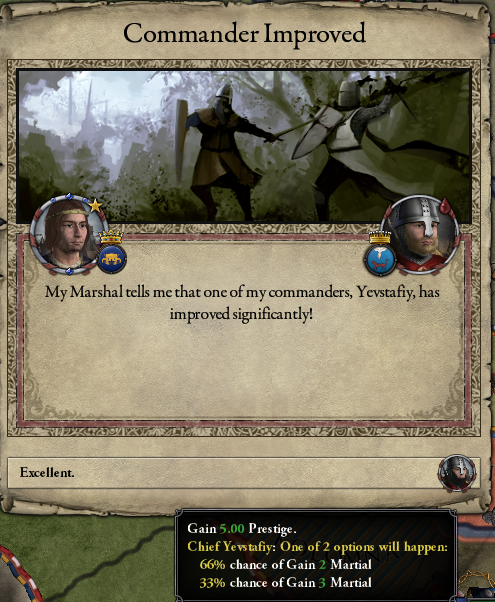 Peace is made in April of 879 and Ryazan is made part of the chiefdom; Ryazan's defeat is a death knell for the old faith, as the heretics have no allies left to call.   Ryazan, as the last major stronghold of the old rites, is full of heretics who shun the Slavic church; the veche appoints the priestess Viacheslava as the leader of the cities of Ryazan and Pronsk, while Kolomna is given to commander Iziaslav, for his outstanding performance during the last few wars.    Ilmen's recent expansion at the expense of its neighbors hasn't gone unnoticed by the Suomenusko tribes and, in 879 they form a mutual defense pact against Ilmen.  Ruslan returns to Novgorod in June and declares a celebration in honor of Jarilo for blessing the chiefdom with a victory over the heretics of Ryazan.  Ruslan uses the Jarilo festival as an excuse to talk to some of his more heretical vassals; with the defeat of the last major old Slavic chiefdom, they wisely choose to embrace the reformed faith.    The celebration begins with a small hunt where Ruslan meets one of his old commanders, now a landed chief since his father passed away. The two men get to talking and reminiscing about the wars they participated in; by the end of the night the two are the best of friends.  The festivities start the next day, with the picking of one of Ruslan's vassals to represent Jarilo; Ruslan's cousin Rodislav is chosen and the assembled chiefs shower him in gifts and appreciation. Once the proper observations are made to honor Jarilo and his representative, the feast starts.    While the feast itself is going alright and everyone is enjoying themselves, until Ruslan's uncle Rodislav manages to vomit all over the priestess of Ryazan. Shamed and humiliated, Ruslan apologizes for his oafish uncle; thankfully Viacheslava accepts his apology. Despite the disturbance, when the assembled chiefs leave the next day, they all agree that the Jarilo festival was truly one to remember.   Infighting and disagreements about how best to prevent Ilmenian expansionism causes the defensive pact to fall apart in December of 879. 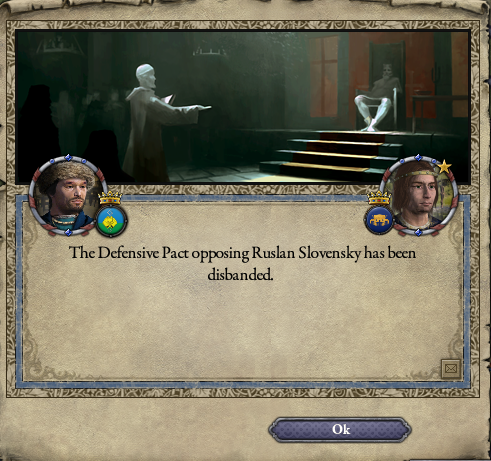 In February of 881, the high chief of Moravia asks for Ruslan's permission to marry his heir to Ruslan's daughter Malusha; Ruslan agrees, eager to again some allies within Poland, should the two Slavic powers ever come to blows.  Ruslan's chief physician, with the help of the priests of Khram Yarilo, publishes a small book about medical science. Most of it is plagiarized from Greek and Albani sources, but there are a few new ideas contained within it; while it doesn't gain much traction outside of the chiefdom, in the Slavic world it becomes notable as one of the first serious medical texts of the time.  The rest of 881 passes quietly and, when the veche is reassembled in January after a short break, Ruslan has an announcement. First, he has declared himself the chief of all Estonians and second he declares himself tysyatsky of Ilmenia. Ruslan's declaration sends the veche into a frenzy of activity, since the second declaration now officially puts Ruslan on the level of the Polish kings, at least in terms of power and administration. There's one key difference to the Polish kings, though: Ruslan has declared himself tysyatsky, not king. While the difference may appear slight at first blush (a tysyatsky is simply a chief with an extremely large army under his command, typically at least one thousand men), by declaring himself tysyatsky, he's subtly said that he's a servant of the veche, specifically the military arm of the veche. By claiming the title of Tysyatsky of Ilmenia, he's effectively made himself a member of the veche, on their level, but not above it. But Ruslan's dream of ruling the largest Slavic realm in the east has finally come true.  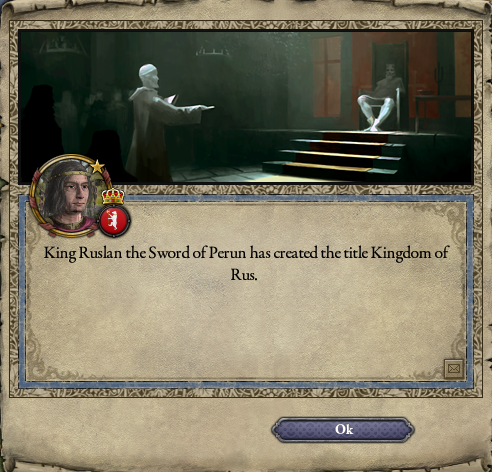 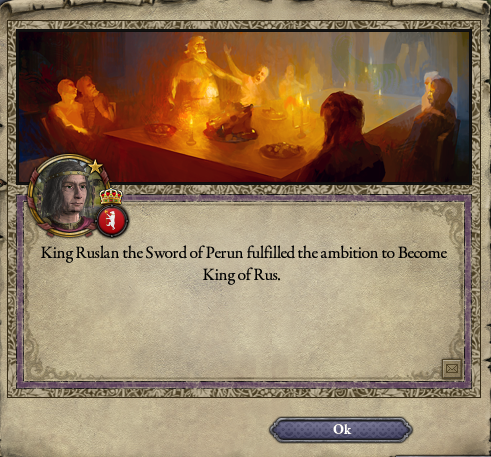 Ruslan isn't the only one with big news, as Chief Rodislav of Toropets declares himself High Chief of Belo Ozero; while Ruslan and the veche have been focusing on expanding Ilmen through force of arms, Rodislav was slowly conquering other chiefdoms within Ilmen, until he controlled most of Estonia and the northern chiefdoms. Ruslan and the veche can't stand to have such a dangerously big threat within the chiefdom, even if right now Rodislav is friendly and willing to cooperate with Ruslan and the veche. So, with veche backing, Ruslan demands that Rodislav turn over his title as High Chief of Belo Ozero; in doing so, Rodislav will also give up vassalage over any chief under his control, though he'll still get to keep any lands he personally controls. Surprisingly, Rodislav agrees to the demand.    In return for their support in bringing the self styled High Chief Rodislav to heel, the veche asks that Ruslan delegate some of his power to regional chiefs, so Ruslan raises Chief Illiya of Kalevan to the Chief of All Estonians. Ruslan also grants the city of Kurzeme to his son Terentiy as part of the deal. 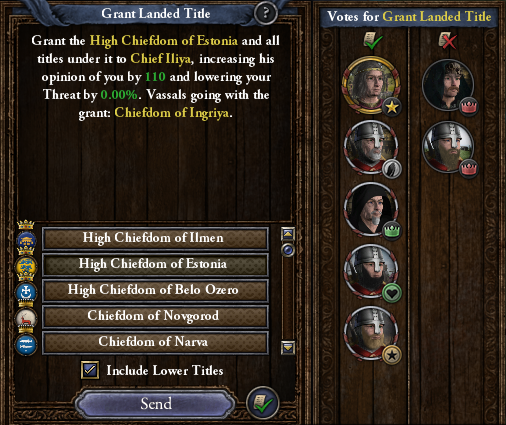  Ruslan and the veche continue to delegate power as, at the start of 883, Chief Briachislav is made High Chief of Belo Ozero and tasked with defending the northeast from Suomenusko raiders.  Back in Novgorod, Ruslan is having problems with a woman, claiming to have had an affair with him. Ruslan has been so busy with war and running the chiefdom, he hasn't had time to have an affair, but he's worried that such rumors will distract from the important work of running Ilmenia. While hunting with his friend Mitrofan, he brings up his problems with the woman. Mitrofan is sympathetic and offers to help, if the price is right. Ruslan is disgusted by the greed of his supposed friend and leaves in a huff; Ruslan then proceeds to break all contact with Mitrofan, ending the friendship.    In 883, Ruslan proposes a war against the Khazars, who have recently conquered the Krivichi, a tribe composed of Ilmenians and Severians; he hopes to liberate the Ilmenians of Vitebsk and, at the same time, gain control over the city's trade ports.   The Khazars send horse mounted raiders into Ryazan, defeating the garrison at Moskva and Pereyaslavl Zalessky. Strangely, they decline to lay siege to the towns, instead contenting themselves with raiding the countryside and burning small farms to the ground. 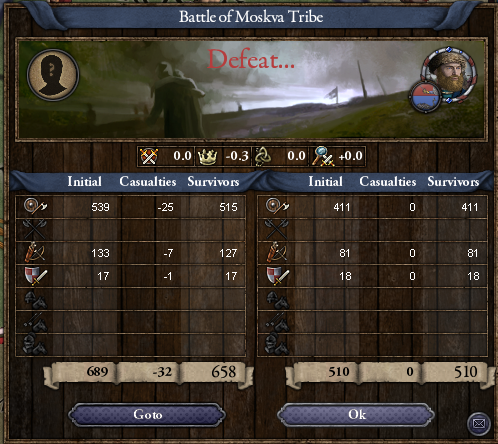  The Ilmenian army shows the Khazars how to properly wage war and Vitebsk is seized in May of 884. Almost in response to the loss of Vitebsk, the Khazars take Pronsk. Instead of moving to take back Pronsk, as the Khazars probably hoped he would, Ruslan takes Polotsk and Orsha, securing the area.  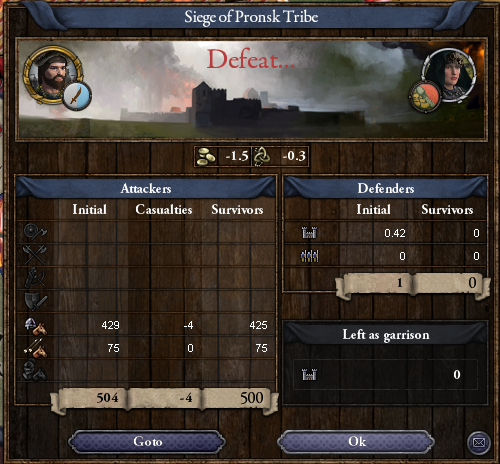   Next the Ilmenians head to Vyazma and take it and the temple of Dukhov. So far, with the exception of Pronsk and a few early battles, the Khazars have been remarkably quiet.  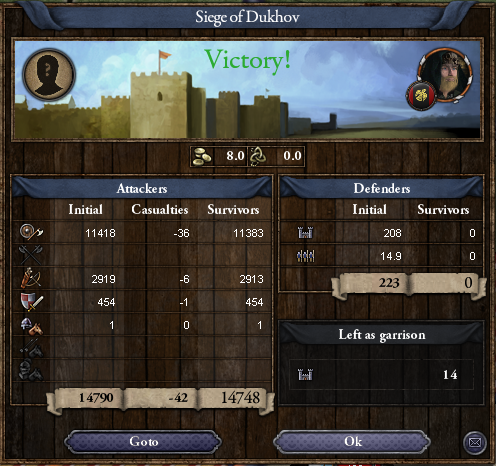 Ruslan finally manages to pin down a Khazar army at Orsha and defeat them; the Khazar army was incredibly small and nothing compared to the rumors of vast horse mounted armies. The Khazars try to break the Ilmenians at Orsha again in 885, but again have no luck in taking the city from the numerical superior Ilmenians.   Finally, the Ilmenians engage a large Khazar force at Kolomna; during it, Ruslan meets the Khazar khagan on the battlefield and, after a short exchange, the khagan runs off with minor injuries. With their leader retreating, the army follows and the Ilmenians carry the day, largely in part thanks to Ruslan.   Completely humiliated, the Khazar khagan surrenders on June of 885 and Vitebsk is secured for the chiefdom.  Ruslan doesn't rest long and just a few days later he's marching on the remnants of the Ryazan chiefdom, now centered in the city of Mozhaysk. The city itself falls without any resistance in December of the same year, and by the start of the new year, the city is in Ilmenian hands and peace reigns once again.    In 886, Ruslan declares himself Chief of the Livonians, usurping the title from the last living descendant of the old chiefs that ruled the area. The title is given to one of Ruslan's relatives.   The old Khazar khagan dies in 887 and Ruslan is quick to jump on the khaganate once again, this time to seize Polotsk. Once word of the war spreads, a large group of warriors arrives in Novgorod, mostly made up of Krivichi nobles and farmers who lost their land when the Khazars took over the chiefdom.   Polotsk falls in September without too much fight; this is in large part thanks to the Krivichi who accompanied the Ilmenian army. Ruslan then swings towards Orsha, where they engage and obliterate a small Khazar force. Orsha falls in October.    The war against the Khazars inspires military innovation, mostly in siege craft, but also ways to adapt the Khazar hit-and-run tactics.  The Ilmenian army engages the main Khazar army at Kolomna, where they defeat the smaller Khazar army. With the Khazars defeated, Ruslan orders the Ilmenians to Bryansk, another Severian city taken by the Khazars. Bryansk falls without issue and the temple of Pochep follows shortly after. It would appear that the main Khazar force will no longer be an issue, following their loss at Kolomna.    Ruslan then marches his army to the Khazar capital of Pereyaslavl, which used to be part of a larger Severian realm. The city falls in September of 888 and with it, peace is not far behind. Polotsk is turned over to Ilmenia and Ruslan returns to Novgorod once again a hero. 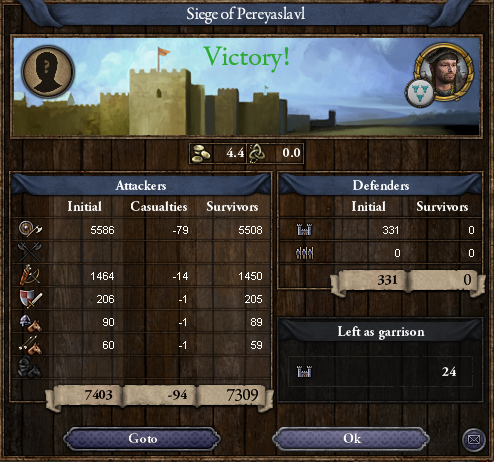  In March of 889, the Old Slavic heretics of Ryazan rise up, hoping to retake the chiefdom and establish an Old Slavic state. Ruslan doesn't intend to allow that to happen and his response is swift and brutal and the rebels are defeated two months later in June.    To celebrate, Ruslan holds a Jarilo festival in the early days of July and Chief Yevstafiy is chosen to represent Jarilo this year. With Jarilo chosen, he is made the guest of honor at the feast in honor of Jarilo.    Just like the last Jarilo festival, things don't go so smoothly, as High Chief Illiya, chief of the Estonians, is caught having sex with a servant girl in the middle of the feast. While everyone can appreciate the lust that the spring god Jarilo can inspire, there have to be limits to what can be done in public. Still, despite Illiya's actions, everyone has a good time.   Tysyatsky Ruslan dies on August 11, 890 in his bed. He passes peacefully and, after a proper mourning period, Ruslan's son Vysheslav is elected Tysyatsky of Ilmenia. Ruslan's reign marks the end of the Tribal Period of Ilmenian history and the start of the Tysyatsky Period.  History remembers Ruslan as Tysyatsky Ruslan Pervyy Mech, often translated as Ruslan the First Sword.
|
|
|
|
How large is the realm at the moment? It must be massive by this point.
|
|
|
|
Josef bugman posted:How large is the realm at the moment? It must be massive by this point. I'll be doing another state of the world in one or two updates (I'm aiming for one every 50 years, at least in CK2), but by this point I was giving Poland a run for their money, in terms of sheer size.
|
|
|
|
You done good, Ruslan.
|
|
|
|
Chapter 21: The Tyrant Vysheslav, like his father Ruslan, is a patient humble man, with a zeal for the Slavic faith that most men aspire to; this zealousness doesn't exactly mesh with some of his darker desires and its fairly common knowledge that he lusts after men. In reaction to these rumors, Vysheslav has sacrificed an eye and an arm to the gods, to prove that he is a pious man. Of course, it probably doesn't help that his dwarf wife prefers the company of women and the two only make appearances together at official events.  Now that he's tysyatsky, Vysheslav is expected to keep a stable of concubines to help continue the family line and so, despite his personal distaste for the practice, he takes some concubines, most of who are prisoners of Ilmenia, guaranteeing that they'll hate him and want nothing to do with him, while still, on paper, fulfilling his familial obligations.   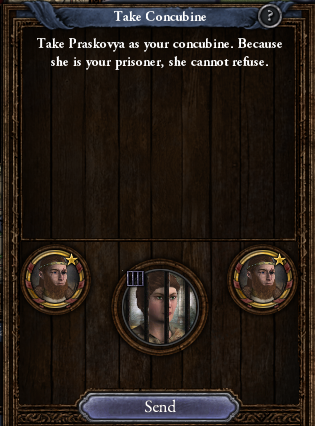 Still, despite Vysheslav's best efforts to interact with his wife and concubines as little as possible, he does manage to conceive a second son with his wife Veleslava, which helps quash some of the rumors surrounding him.  In February of 891, Vysheslav finally catches wind of who started all these rumors about his manhood: its his kinsman, Chief Ruslan of Ladoga. Vysheslav bribes several members of the veche to gain their support and then sends his marshal out to arrest Ruslan, on some trumped up charges of not paying the proper church tithe. Ruslan doesn't resist, confident that his supporters in the veche will get him out, but their voices are in the minority.   As summer starts, a small diplomatic mission from the Kingdom of Bulgaria, containing Queen Vladislava, arrives in Novgorod, seeking to speak with "King Ruslan the Great." They are disappointed to find that Ruslan has passed away, but they are more than happy to meet with Vysheslav and the veche (who are both quick to correct them that there is no king of Ilmenia). As it turns out, the Bulgarians are interested in establishing a trade route with their Slavic brothers to the north; Pannonia and the Balkans have been in almost a constant state of warfare, as the Avars try to reclaim their lost land from the Slavs, making it hard for Bulgaria to trade with their normal partners. After a short discussion, the veche agrees to accept trade with Bulgaria and soon Bulgarians can be seen in Novgorod arguing with the Greek, Ilmenian, and Albani traders. Rostov, the first stop for Bulgarian traders, prospers from the new route.    Vysheslav puts some of the money gained from the new trade route to building a statue of his father to adorn the veche's meeting hall, perhaps as a reminder that he's related to the man the veche owes so much to.  Vysheslav also continues to use fear to control his vassals; when his spymaster finds some incriminating information of one of his vassals, he blackmails the man into staying loyal to him, but not to the veche. In fact, he uses this blackmail to control the chief's vote in the veche, giving him a slight majority.   The Norse raiders continue to harass the Ilmenia's trade with island of Alban, necessitating a greater investment in more ships and supplies. Its becoming clear that something must be done about these savages, and soon.  Vysheslav's statue of his father is finished in 892 and placed in the veche hall, intentionally positioned to watch over the assembled veche members; everyone agrees that its slightly creepy.  In March of 893, one of Ilmenia's nomadic neighbors approaches Vysheslav to ask for one of Vysheslav's relatives for their khan's wife. Vysheslav begins to turn the offer down, saying that he has no interest in marrying into the Tengri heathens, but the messenger swears that Khan Bashtwa has accepted the Slavic gods into his heart. Vysheslav can hardly believe it, but the man quickly starts reciting scripture and telling the story of how Bashtwa converted after seeing Perun's axe in his dreams. Convinced, Vysheslav accepts the proposal, happy that the Slavic church has such a strong appeal with the nomadic tribes to the east.   August brings new courtly scandal, as a fight between Vysheslav and his wife ends with the two sleeping in separate chambers. The rumors that plagued Vysheslav's early years as tysyatsky are back.  Vysheslav is eager to escape these rumors and in September he begins planning another trade mission to Alban in an effort to set up an alternative trade route to the island to make it harder for the Norse to raid Ilmenian trade ships.  The veche approves of the trade mission and provides a massive trade ship; their only condition is that Vysheslav must bring with him a contingent of Slavic priests, partly so they can study the Albani religion, but also to try and spread the Slavic faith to the island. Vysheslav is only too happy to have the priests accompany him and he is often seen debating theology with them on the deck of the ship. The Khram Yarilo also pays for the priests' passage, easing the realm's burden for financing the trade mission.   Vysheslav and his men set off on the 25th of September, hopeful that their mission will result in new wealth for Ilmenia.  They arrive in Alban in early November and are greeted by several armed men who assume the Ilmenians are Norse raiders. Using a translator fluent in Albani, Vysheslav explains that their mission and who they are, but, much to his surprise, the soldiers appear to not understand Albani, despite being natives to the island. The Ilmenians are even more surprised when the men start speaking a harsh language, reminiscent of that of the Norse raiders (at least to their ears). Fearful that they've actually encountered Norse raiders, the Ilmenian guards arm themselves and prepare to fight. After a few tense moments, one of the foreign soldiers speaks up in what sounds like broken Albani. The Ilmenian translator, with a lot of effort, makes himself understood, though the man claims not to speak Albani but Welsh and that the Ilmenians are speaking Cornish. The trade party is then escorted to the local priest (called an archbishop by the not quite Norse), who, after some explanation, welcomes the Ilmenians to the city of York. The priest explains that the Ilmenians aren't completely unknown this far north of Angliya (the Ilmenians are extremely confused, apparently Alban has not one but two names?) and that Vysheslav and his men are more than welcome to discuss trade with the priest, who rules the city and the surrounding countryside. Vysheslav, eager to get negotiations started, offers up thirty of his best men to the priest Gamall as a gift; Gamall is extremely impressed with this show of wealth and generosity.  Priest Gamall holds a small feast to celebrate the arrival of the Ilmenians, during which Vysheslav's steward embarrasses himself and Vysheslav for his poor table manners. After Vysheslav shouts at the man, his behavior and manners improve.  The priests from Khram Yarilo carry out their mission of learning about the Albani faith, as well as attempting to spread the Slavic faith to the island; the priests of York, as well as Gamall, are not too happy with the Slavic priests for attempting to convert the citizens of York, but Vysheslav supports the rights of his priests to preach and offers to take some Albani priests back to Novgorod, just as Rodislav II Dobro did. Gamall declines to take him up on his offer.  Despite this disagreement, Gamall and Vysheslav are able to find enough common ground to strike a deal between their two realms and, at the start of December, the Ilmenians sail back to Novgorod, carrying the first load of goods.   When the trade mission arrives back in Novgorod in February of 894, Vysheslav's steward asks for a cut of the profits from the first trade mission, claiming that the whole mission was his idea; Vysheslav points out that all the man did was his job and, given how he jeopardized the whole thing with his bad manners, he really doesn't deserve anything besides the praise of the veche. The steward is not amused.  A month later, Vysheslav finally uses his slight majority in the veche to get them to back a war against the High Chiefdom of Murom, a Mordvin chiefdom that holds an important city along the Oka River; the Mordvins of Murom have been raiding Bulgarian trade ships and Vysheslav is sick and tired of it and his solution is simple: the annexation of Murom for Ilmenia.  The Chief of Tver is a vocal opponent of Vysheslav's and his manipulation of the veche through nefarious means and he uses his sway in the veche to throw up a lot of resistance to the war against Murom, mostly to mess with Vysheslav. Vysheslav uses his connections to arrest Chief Mstislav, silencing yet another of his opponents.   The High Chief of Murom sends a small force to take Kolomna, mostly as a token of resistance against the far bigger Ilmenia, and the Ilmenian army easily defeats them. Vysheslav uses this low stakes battle to test out some new tactics inspired by the Khazars and his tactical ability grows as a result.   Vysheslav continues to grow his power in the veche, using a combination of blackmail and legalism to maintain his control. Whispers begin that Vysheslav will end the veche once and for all, declaring the position of tysyatsky hereditary.   The city of Murom falls in August with little resistance and peace is made not long afterwards; Murom is made a part of Ilmenia and trade with the Bulgarians continues uninterrupted.   Vysheslav returns to Novgorod and continues his campaign of imprisoning political enemies; this time the Chief of Yaroslavl is his target, as Vysheslav claims the man refused to send troops to aid during the war to take Murom. The veche, both through bribery and threats, agrees to back the arrest. Chief Nikita of Yaroslavl, seeing that he has no support in the veche, agrees to pay a small sum of gold to Vysheslav by way of apology for not supplying troops for the Murom conflict.  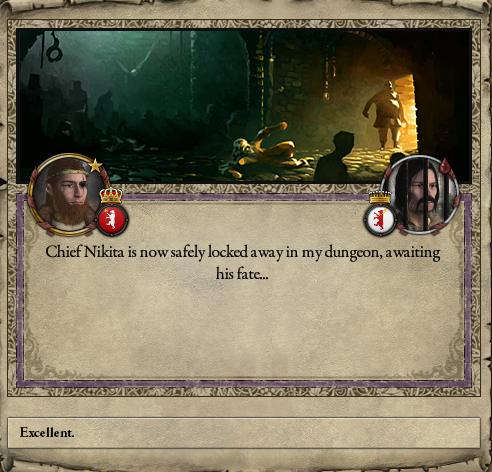  Vysheslav's tyranny hasn't gone completely unnoticed, particularly by the peasants, who feel that their local veches are having less and less influence and say in the Novgorodian veche. This comes to a head in September of 895, when the Mordvin of Kolomna rise up in revolt, citing increased taxation and less say in the Novgorodian veche as their major grievances.  The Ilmenian army finally engages the rebels at Kolomna at the start of January, in the dead of winter. Vysheslav is quick to use the cold weather to his advantage and he becomes known for getting the most out of his troops during winter. The battle ends in an Ilmenian victory and the rebellion's leader joins Vysheslav's political enemies in the dungeons of Novgorod.    Perhaps to appease his detractors, Vysheslav creates the High Chiefdom of Ryazan and awards it to Priestess Viacheslava, making her the Archpriestess of Ryazan.   Vysheslav also makes time for his wife, naming her both the court dwarf and court jester. She is, unsurprisingly, not amused by her husband's antics.   A year after taking Murom from the Mordvins, Vysheslav returns to take the cities of Vladimir and Obran Osh from the Mordvins; with the support of the Archpriestess of Ryazan, Vysheslav is able to ignore most of the veche and declares a holy war for the two cities.  The Ilmenians quickly take Vladimir from the Mordvins and Vysheslav is confident that the war will soon be over. So confident of his abilities and the abilities of the Ilmenian army, he attacks the Mordvins at Obran Osh, despite them significantly outnumbering him and his men. Vysheslav's confident costs him, as he is maimed by a Mordvin during the battle, causing him to fall off his horse and badly breaking several of his bones. With their tysyatsky defeated, the Ilmenians retreat.     Vysheslav is rushed back to Novgorod, as his commanders are sure the he does not have much time left in this world and, with their tysyatsky out of their hair, they are able to defeat the defenders of Obran Osh and take it for Ilmenia.   Vysheslav never makes it back to Novgorod, nor does he ever learn of Ilmenia's victory over the Mordvins of Obran Osh; instead, he dies in transit to Novgorod. The official cause of death noted in the veche records is due to his wounds, but several people note that Vysheslav's head had somehow become separated from his body sometime between the First Battle of Obran Osh and his return to Novgorod; the veche doesn't bother to look into these rumors and instead elect one of Vysheslav's prisoners, Mstislav of Tver, as the new tysyatsky.  History remembers Vysheslav as Tysyatsky Vysheslav Tiran, often translated as Vysheslav the Tyrant.
|
|
|
|
Chapter 22: The Second Sword Mstislav spent the majority of Vysheslav's rule imprisoned and his election to the office of tysyatsky comes as a surprise to him. Just why the veche chose him, a prisoner of the tyrant tysyatsky is also a mystery, though his gregarious nature might've had something to do with it, as he's always had his supporters in the veche. It could also simply be a power play by the veche, a way to make the tysyatsky owe them and keep him under control. Either way, Mstislav is now tysyatsky.  Unsurprisingly, his first act is to release his fellow prisoners; Chief Ruslan of Ladoga, imprisoned for the entirety of Vysheslav's reign, is finally released, cleared of all charges by the veche and Mstislav.  The city of Suzdal falls in October and the confederation of Mordvin tribes that ruled the area is finally subjugated and annexed, bringing an end to the war that killed Vysheslav.   Following Vysheslav's death, Chief Ruslan of Pskov, the tyrant's first son, declared his independence from Ilmenia after the veche refused to elect him tysyatsky. Mstislav and the veche cannot allow Ruslan to remain independent; not only is Pskov in the middle of the realm, but warriors loyal to Vysheslav are flocking to the pretender's banner. To make matters even worse, the Ruslan also took the city of Murom with him when he declared his independence, which allows him to siphon off Bulgarian traders for his own purposes. If left alone for too long, its entirely possible Ruslan will be able to make a move against Ilmenia. Citing the strategic importance of both Pskov and Murom, combined with Ruslan's disloyalty to the crown, the veche authorizes Mstislav to take the two cities back by force.  The pretenders attack the small loyalist garrison at Kolomna, but their own small numbers are unable to hold the city when a larger loyalist force moves to engage them; instead, they make a mad dash for Pskov, to link up with the main pretender army. Unfortunately for them, Pskov falls into loyalist hands before they can ever arrive and instead the pretenders are forced to retreat to Navra, where they are defeated by the vastly superior loyalist army.    Even with Pskov in loyaylist hands, Ruslan refuses to seek peace; unfortunately for him, his courtiers can see where this is headed and one of them attempts to make a deal with Mstislav for clemency. Though many in Mstislav's court want to kill the man where he stands, Mstislav instead simply turns the man away unharmed. Word of his kindness spreads like wildfire through Ruslan's court and soon his supporters start to shrink in size.  Perhaps because of his leniency with the nobles loyal to the pretenders, Murom falls without much of a fight, as the city's veche unanimously vote in favor of declaring Mstislav the true tysyatsky of Ilmenia. Ruslan is quickly arrested and the loyalist army is welcomed into the city with open arms.  Peace is made in June of 898 and Ruslan is stripped of his holdings and titles. Instead of executing Ruslan, as many expect him to do, Mstislav simply banishes the man. While this does leave a potential pretender alive, it does speak well of Mstislav's mercy and forgiveness and helps to reassure the veche and people of Ilmenia that Mstislav is a very different man then Vysheslav. People begin comparing Mstislav to Tysyatsky Ruslan, and soon Mstislav is known as Vtoroy Mech Peruna, or the Second Sword of Perun.     Perhaps to live up to his new nickname, Mstislav professes his support for Perun and even sacrifices a courtier to the god of war, hoping to receive his blessing.   To show that he still venerates Jarilo overall the other gods, Mstislav calls all his vassals to Novgorod to celebrate a Jarilo festival in May of 899. The assembled chiefs choose High Chief Briachislav of Belo Ozero to represent Jarilo this year, much to the man's delight. After a parade through the streets where Briachislav is hailed as Jarilo by the citizens of the city, the assembled nobles arrive at the Khram Yarilo for a massive feast in honor of the patron god of Ilmenia. 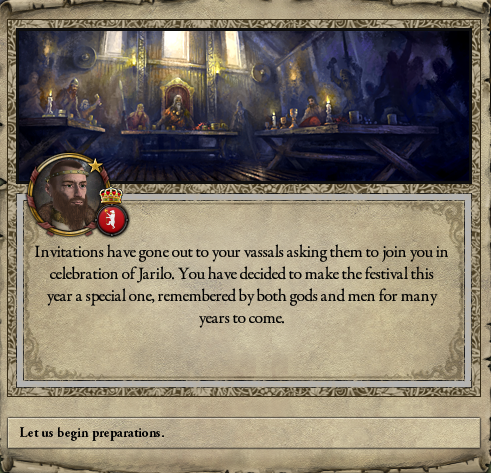   The feast goes perfectly, for the first time in several years and the assembled chiefs leave Novgorod confident in their new tysyatsky.  The Mordvins of Uglich rise up in September, hoping to inspire the other Mordvins to rise up and join them. Their revolt is in vain, as the Ilmenian army easily defeats them.    Since his election as tysyatsky Mstislav has been working closely with the veche, attempting to rebuild the bridges Vysheslav burnt; unlike Vysheslav, he uses more diplomatic means and he becomes known in the veche for taking members who disagree with him out for a quiet drink and a talk about their differences. Mstislav leverages some of his new clout to hand Pskov off to a kinsman.   Mstislav is a very different man than Vysheslav and Ilmenia has already started to recover from Vysheslav's tyrannical rule thanks largely to Mstislav's work to rebuild trust between the office of tysyatsky and the veche. Hopefully Mstislav remain loyal to the veche and the people of Ilmenia and truly earn his nickname.
|
|
|
|
State of the World: 900 Ilmenia has grown immensely, largely thanks to the adoption of the new Slavic faith and the work of Tysyatsky Ruslan; under Ruslan, the heretics of Severia and the heathen Mordvins and Khazars were cowed and laid low by Ilmenian arms and men. Though Tysyatsky Vysheslav's tyrannical actions risked the destruction of all his father had built, Vysheslav's timely death has allowed Mstislav to take the throne and that alone has healed many of the wounds created by Vysheslav. Hopefully, Mstislav and the veche will continue to work hand in hand for the betterment of whole realm.  In Eastern Europe, Poland still reigns supreme, though it has lost the crown of Bohemia following the death of Prendota, as the two kingdoms were divided between his kinsmen. To the south, the Avars have reclaimed all of Pannonia for themselves, breaking the Pannonian Confederation into several smaller, squabbling tribes, each looking to reclaim the Pannonian crown.  The Byzantines have miraculously been able to avoid civil war for more than fifty years and the empire has grown strong, driving the invading Muslims from Anatolia and the Caucasus Mountains. Hopefully they will be able to remain strong and stable enough to stand against the Muslims of the Middle East, but if they don't at least Ilmenia will have new trade partners. 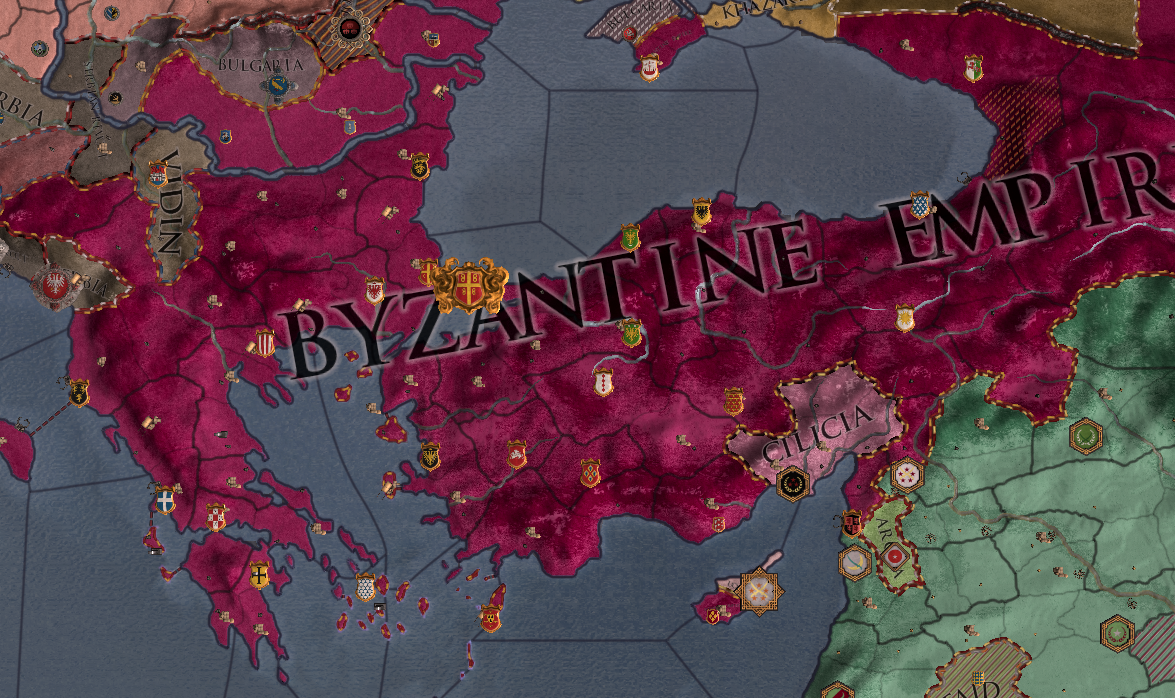 Italy's civil war has ended with victory for the Frankish supported rebels. While the Greeks haven't been driven from Sicily yet, it probably won't be long before the Franks and the Lombards will join forces to remove the Orthodox Sicilians from Italy and make the entire peninsula Catholic.  Despite the victory of the Frankish backed pretenders in the Italian Civil War, Francia has not been doing too well; their involvement in the Italian Civil War was a huge manpower and gold sink, allowing the Muslims of Hispania to gather their forces and strike back against the invading Franks. As a result, they've been nearly driven from Hispania.  The Muslim Djazairids have managed to reunite most of Muslim Hispania under their control, though the Umayyads still maintain a presence. Most of the Umayyads have fled to North Africa, but the pagan kingdom of Mali and the Berber Catholics of Tunis has started to threaten their control of the region; recently the Trento dynasty (Lombard adventurers from Italy who have adopted the local Berber culture) have seized large amounts of lands from the Umayyads, with the help of the kings of Lombardy. Only time will tell if the Umayyads can recover from such a loss.   In Alban, the Welsh have risen to prominence, ousting the Anglo-Saxon Prince-Bishop of Mercia-Northumbria from his seat in York and claimed much of the surrounding lands. To the south, the Kingdom of Wessex tries to assert its control over the remaining Anglo-Saxon kings, but they're hemmed in by the growth of Wales. 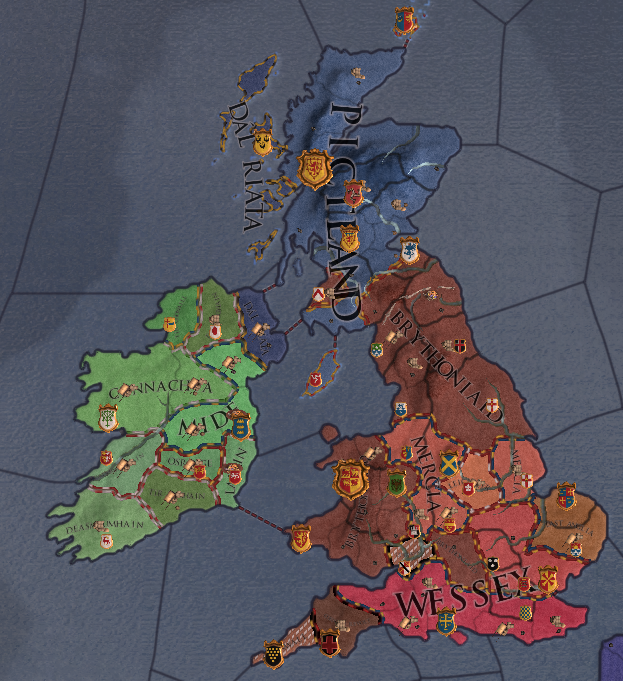 Finland has slowly come under the control of the Norse kings of Scandinavia, though the Fins and Sami tribes have fiercely fought for their independence, but its a losing battle, as the Norse have numbers on their side. In Scandinavia proper, the King of Norger looks posed to dominate the area, if left unchecked.   The steppes continue to be dominated by Tengri nomadic tribes, though the Khazars are facing a revolt by their Slavic vassals khans. Hopefully, the Slavic rebels win and take out one of the few threats to Ilmenian power in the area. 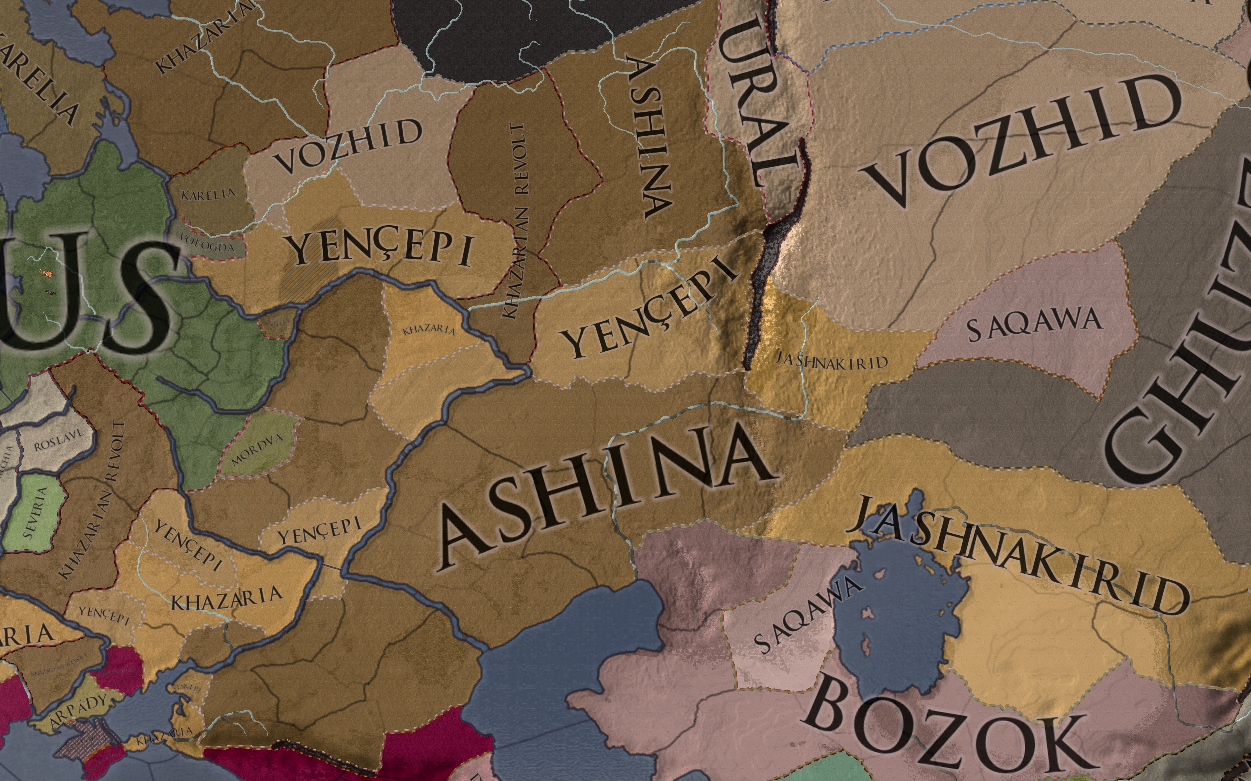 In the Middle East, Egypt continues its slow march to conquer East Africa, while the Middle East proper continues to be dominated by the Abbasid caliphs. Persia has slipped from the Abbadid's grasp and is now full of squabbling Muslim and Zoroastrian rulers, each trying to claim the throne of Persia for themselves.    Religious Map (Slavic holy sites highlighted)  Political Map 
|
|
|
|
Go Wales! Also, the Byzantines have a surprising amount of control over the western Mediterranean.
|
|
|
|
Okay, there seem to be a lot of 1 province areas left on the map. I think we should take them and vacuum them up for the greater good of prettier borders.
|
|
|
|
Soup du Jour posted:Go Wales! Also, the Byzantines have a surprising amount of control over the western Mediterranean. They had most of that stuff thanks to the early start and they never really lose control over the western Med unless something catastrophic happens to them. Josef bugman posted:Okay, there seem to be a lot of 1 province areas left on the map. I think we should take them and vacuum them up for the greater good of prettier borders. Most of the OPMs near us are Slavic tribes and I can't be bothered to fabricate claims on them, since there's plenty of jerk pagans around us to holy war.
|
|
|
|
Vysheslav did nothing wrong. Free him. Free my man.
|
|
|
|
THE LESBIATHAN posted:Most of the OPMs near us are Slavic tribes and I can't be bothered to fabricate claims on them, since there's plenty of jerk pagans around us to holy war. Can't we just claim them anyway?
|
|
|
|
Josef bugman posted:Can't we just claim them anyway? I might in the future, but right now I have an ongoing plan I've titled "Operation Reverse Rurik," so I'm busy with that. crimea posted:Vysheslav did nothing wrong. Free him. Free my man. I can't free him from death! THE LESBIATHAN fucked around with this message at 01:47 on Nov 27, 2017 |
|
|
|
THE LESBIATHAN posted:I might in the future, but right now I have an ongoing plan I've titled "Operation Reverse Rurik," so I'm busy with that. This is already the best plan.
|
|
|
|
There is absolutely no way anything like that could go wrong.
|
|
|
|
Chapter 23: Bane of the Norse Mstislav, along with the veche, has grown increasingly worried about the Norse presence in Finland, as the Finnish and Sami tribes slowly lose ground. While an attack on the Norse isn't the best idea, as their kings are extremely well versed in war, attacking the Suomenusko tribes and securing their land for Ilmenia promises to secure the area for future Ilmenian interests. So, in March of 900, the veche unanimously backs Mstislav's holy war to claim Karelia for Ilmenia. 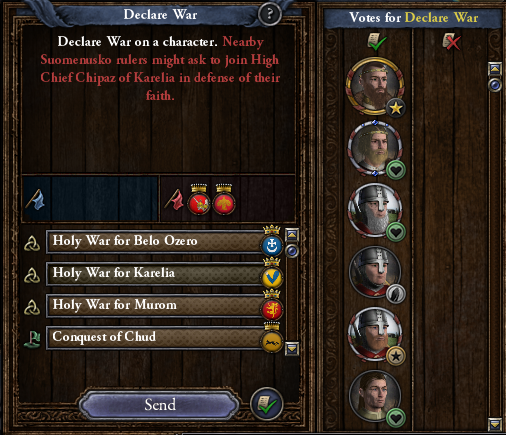 It doesn't take long before Suomenusko raids along Ilmenian borders start to increase, as even the smaller tribes get involved in the war, though not in a way that risks their land or serious retribution from Ilmenia; Kostroma is looted and burned, but its not enough to distract Mstislav from the real prize and instead of rushing to help the border cities, he focuses on making the High Chief of Karelia surrender. Chud, a Karelian city isolated from the majority of the chiefdom, falls to Mstislav and his army, meaning that the bulk of the fighting will now take place in Karelia and Finland.   Apparently, the Suomenusko alliance has different ideas about where the war should be fought, though, as their main army, composed of ten thousand men, takes the southern city of Sudzal, before moving north to Yaroslavl. Mstislav knows that he can't secure Karelia with a large Suomenusko army rampaging around the countryside, so he marches to Yaroslavl and the two armies clash, staining the Volga red with blood. When its all said and done, the Suomenusko army flees the field; while Mstislav tries to figure out exactly how many of his men are dead, a group of soldiers rushes up to him and hurriedly explain that they've found the high chief of Karelia sprawled out on the battlefield and, while he's terribly injured, he's still alive. Mstislav rushes to the scene and, sure enough the high chief is there, barely conscious; he's quickly captured and forced to sign an extremely favorable peace treaty, giving up almost all of his lands to Ilmenia.    Mstislav returns in Novgorod In January of 901, less than a year from when he first left to go to war and already stories and rumors hint that he is uniquely blessed by the gods and that under him, Ilmenia will see another great expansion. Mstislav leverages this fame to get the veche to agree to giving one of his relatives large portions of Karelian land. To prevent any rumors that he's attempting to cement Slovensky control Finland and stack the veche in his family's favor, Mstislav also makes sure to give some land to a son of a prominent Novgorodian merchant.    Though Novgorod itself has never suffered a siege and its defenses are in fine condition, the veche is concerned about the potential of a Norse adventurer using the Dnieper to invade Ilmenia, so it falls on Mstislav, as the military arm of the veche, to see if anything can be done to further increase the defenses of the city. Of course, Mstislav doesn't have a lot of architectural knowledge, so he asks one of his friends, a man by the name of Vyshata who is well versed in the ways of Greek architecture. Vyshata is more than happy to help and soon Novgorod's defenses look practically brand new.   One of Mstislav's many, many relatives, a man by the name of Fedot, asks for Mstislav to press his claims on Mecklenburg; the problem is, the veche has already turned down Fedot. Without the veche's support, Mstislav is forced to turn his relative away.  Turns out Mstislav has another reason for turning Fedot away: he's planning his own war against the Norse kingdom of Sweden and he needs the full cooperation of the veche to make it happen; the aim of the war is to reclaim the portion of Karelia Sweden took before Ilmenia got involved in Finland. War is declared in March of 902.  The city of Kexholm and temple of Raivola fall to Ilmenia without incident, and it looks as though the Swedes will allow the loss of Swedish Karelia without any sort of response, but in October a small Swedish army lands at Savo to lay siege to the city. Mstislav and his army engage the Swedes and defeat them fairly easily.    The Ilmenian army is now completely unopposed in Swedish Finland and the city of Austerbotn falls to them; the Swedes finally manage to land an army of any significance in Kexholm and try to retake the city, but Mstislav is ready for them and he quickly marches his army to Kexholm to defeat the Swedes. Mstislav's ability to efficiently run an army and campaign becomes legendary among his men and soon other Ilmenian commanders are looking to emulate his style.    With most of Swedish Finland under Ilmenian control and the largest army he can summon soundly defeated, King Ewald of Sweden makes peace with Ilmenia in March of 903. Again, Mstislav returns to Novgorod and his legend continues to grow, as he's dealt the first major blow against the Norse since they started raiding nearly a hundred years ago; it seems that nothing can stop Mstislav.  Mstislav visits the Khram Yarilo almost as soon as he returns to Novgorod and offers tribute to Jarilo, marking a return to the leaders of Ilmenia following the patron god of the realm. While at the Khram Yarilo, Mstislav bumps into High Chief Zbignev of the Estonians and the two begin to chat; the chat turns into a full blown conversation, followed by dinner together while they discuss the finer points of the Slavic faith. The two part as life long friends. 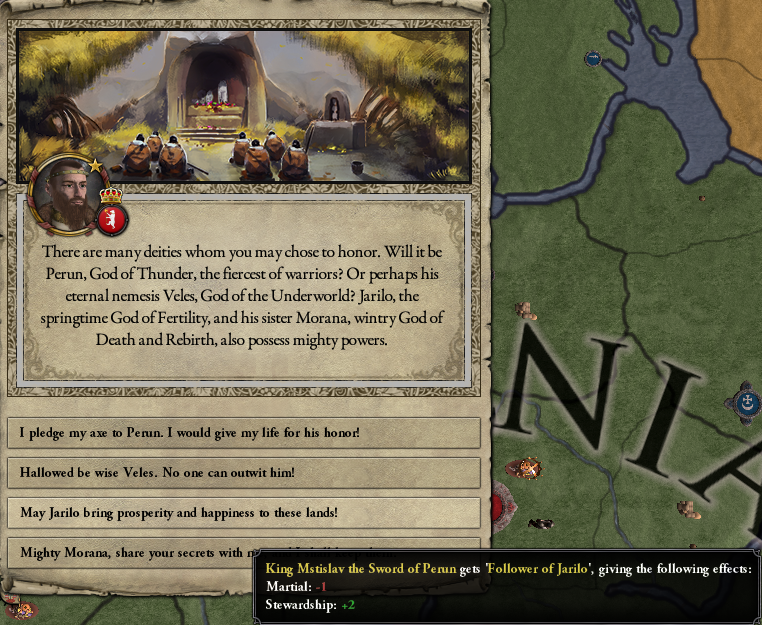  In October of 903, High Chief Virdyan, the high chief of Murom in exile in the farthest reaches of Finland, declares war on Ilmenia with the intent on taking one of the cities he used to control; how, exactly, he plans on doing that is a complete mystery. 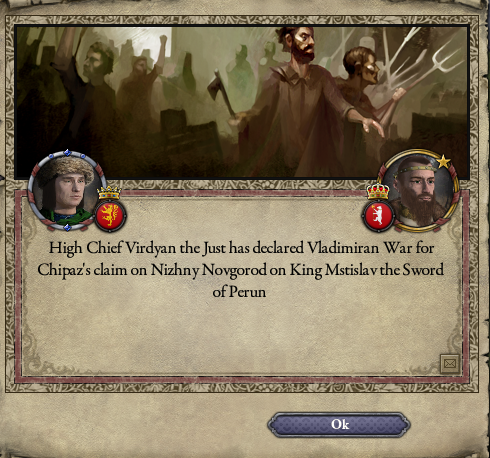 Virdyan's army arrives in Raivola and its barely larger than two hundred men. The Ilmenians easily defeat Virdyan's army and Mstislav offers the high chief a white peace, which Virdyan accepts and the war is over in June of 904. Once again, Mstislav finishes a war in less than a year.   Mstislav stays in Novgorod to take a breather from the near constant warfare that has plagued him during his reign; he quickly gains a reputation for being just, as he takes a personal interest in passing judgement on nobles of the realm. Mstislav also has his marshal instruct his commanders on the niceties of siege craft; since the Norse and Suomenusko tribes are known for their hit and run tactics, quickly sieging a city is key to quickly winning a war against the pagans.   He also personally intervenes in a dispute between one of the members of the veche and his wife; his words manage to calm the two arguing lovers and Chief Yevstafiy is so grateful that he promises to vote with him in the veche from that moment forward.   Mstislav cashes in on Chief Yevstafiy's support in March of 905, when he asks the veche for a holy war against the Chiefdom of Kantalahti to claim all of his lands.  The city of Karjala falls to the Kantalahti army but they're chased off when the larger Ilmenian army begins to threaten their position. Karjala is back in Ilmenian hands less than a month after being taken.   The Ilmenians, having secured their Finnish holdings, march on the Kantalahti homeland; the tribe's namesake city falls in December of that year and, with their capital in Ilmenian hands, the chief is begging for peace. As the new year begins, the Kantalahti lands all fall under the control of Ilmenia.    Mstislav's reputation for winning wars in less than a year has reached mythic levels and he uses this to further his control over the veche, though unlike previous chiefs and tysyatskys he restricts his control to being able to give land to his relatives and friends.   The Slavic kings from central Europe continue to want to marry into the Slovensky dynasty, as the king of Croatia asks to marry Mstislav's niece in September. Mstislav is only too happy to cultivate a potential anti-Polish alliance, so he agrees. 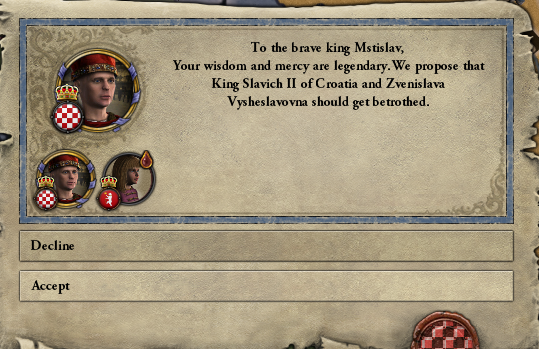 Mstislav isn't done with the Norse in Finland, not by a long shot and in May of 907 he makes his intentions known to the veche: he plans to removed the kingdom of Norger from Finland. Its an ambitious move, but Mstislav's prior successes have convinced the majority of the veche to side with him.  Ilmenia's declaration appears to have caught the Norwegians off guard, as they scramble to assemble the local tribal chiefs and consolidate the local armies; the Norwegians manage to gather a respectable force, but its no match for the Ilmenians and the Norwegians are defeated at Tavastchus. The city soon follows.  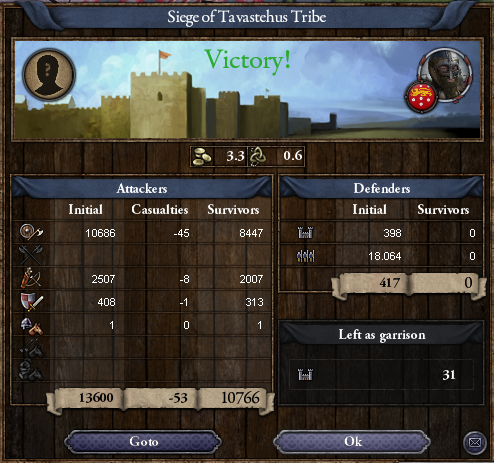 The Norwegians start to reassemble their army at Nyland, but Mstislav doesn't believe in taking chances, so he moves to crush the threat before it becomes serious. The battle goes as expected, as Ilmenian arms and strategy continue to win the day. Nyland is soon conquered, putting the majority of Norwegian Finland into Ilmenian hands.   The priests of Khram Yarilo proclaim that Mstislav's victory over the Norse is imminent and that Jarilo has blessed both the tysyatsky and Novgorod. Whether its true or not, the people of the city certainly believe it and it has an effect, even if its only because the citizen imagine it.  The Norwegians continue to try and stop the Ilmenians, but every time they attempt to gather an army that could even begin to threaten, Mstislav engages them and defeats them. The Ilmenian army also continues to slowly siege Norwegian Finland, taking city after city. It is beginning to look like the priests of Khram Yarilo predicted correctly.   Things are going according to plan until, in March of 910, the Mordvins of Belo Ozero rise up in revolt. It just wouldn't be a war without a peasant revolt!  Mstislav leaves a small garrison in each of the cities taken so far and makes his way to Belo Ozero. By now, the warriors of Ilmenia are adept at defeating significantly smaller rebel forces and in May the rebellion is completely crushed. 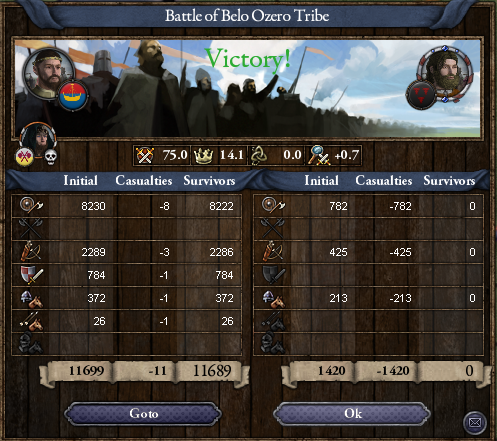  Perhaps sensing weakness, the chief of Gorodez declares war on Ilmenia. Mstislav is starting to get annoyed by the distractions and he moves to teach the foolish chief a lesson, but before he can Nizhny Novgorod falls to the Mordvins. Mstislav defeats the Mordvin army and, realizing he has no way to actually stop the Ilmenians from completely destroying his lands, he offers peace in August. Mstislav, wanting to get back to "his war," accepts the peace offer.     Mstislav calls upon all the merchants of Novgorod and Ilmenia to lend him their ships; he has an ambitious plan to quickly get his army back to Finland. The merchants respond and soon the Ilmenian army is loaded on to their ships and shipped to Finland. The Norse soldiers of Finland see this approaching fleet, followed by an unloading of what feels like infinite troops upon their shores; its absolutely terrifying to them and the Norse begin referring to the Ilmenians as Ruotsi, coming from the Norse rods, meaning men who row. The Norse don't see any distinction between the Ilmenians, Severians, and the other East Slavic peoples and soon Western European map makers begin to referring to Ilmenia as Rus and the East Slavic people collectively as Russian. While Ilmenia and Ilmenians remain the norm in Alban and the Byzantine Empire, the Franks, Lombards, and Berbers being to refer to them as Rus and Russian.   Mstislav's conquest of Finland continues uncontested, as battle after battle, the Ilmenians win. City after city also falls and, in December of 912, the Norwegians finally seek peace. With one treaty, the Norse have almost been completely removed from Finland. An unintended side effect of Mstislav's conquest is that several Norse nobles fleeing from Finland with their personal retinues end up in the employ of the Western Roman Emperors; the Norse refer to themselves as væringi, coming from the Norse vár (meaning pledge or faith) and gengi (meaning companion). The Franks, naturally, try to Latinize væringi, turning it into waryengi. The Waryengians, as they come to be known, become the personal guards of the Carolingian emperors and are even given foederati status by the emperor.   Mstislav has done what no one thought was possible: defeated the Norse on a level playing field and driven them almost completely out of Finland; it appears nothing can stop him, not even the fearsome Vikings. Truly, he has earned his nickname.
|
|
|
|
Carolingian Varangians? Now I've seen everything!
|
|
|
|
Luhood posted:Carolingian Varangians? Now I've seen everything! I really liked this and the Norse constructing the term "Russian" to refer to the slavs.
|
|
|
|

|
| # ? Apr 27, 2024 15:07 |
|
Sinner Sandwich posted:I really liked this and the Norse constructing the term "Russian" to refer to the slavs. That's the actual origin of the word Russian; some Finnic tribes used it to refer to Sweden though, since both the early Russians and Norse used boats. The more you know!
|
|
|
















